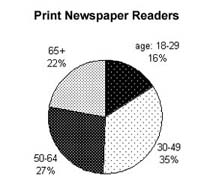| will newspapers survive? |
||||
|
To many Americans of a certain age, the idea of a world without newspapers would have been unimaginable even ten years ago. But it has become clear that newspapers are part of an encompassing, irreversible migration or dispersal in which the central institutions and practices of print culture are remediated in the proliferating screens and pods and PDAs of our digital future. To recognize this is not, however, to predict the immediate death of the newspaper, for new technologies never displace older systems with decisive suddenness; the process of media transition is nearly always accretive and gradual, a mix of tradition and innovation, in which emerging and established systems interact, shift and collude with one another. Scribal practices, for example, survive deep into the era of print; newspapers and books coexist in an often nourishing interaction with radio, movies and television. Our series title, “Will Newspapers Survive?”, then, is a provocation, a shorthand for more salient and consequential questions. We’ve asked working journalists, media critics and scholars, and digital visionaries to distill their best thinking about the ongoing transformation and apparent decline of American newspapers.
Does the aging of the newspaper reader signal the ultimate demise merely of what some irreverent utopians have called a dead-tree technology? Or do newspapers – or some still-extant idea of newspapers – embody values of civic responsibility, fairness and political independence that are imperiled by a disappearing readership? How has the blogosphere changed the practice of journalism? For some of our speakers the new technologies promise a new and richer journalism, an “open source” as newspapers could never be, breaching the wall between producers
of news and its readers. For others, this empowerment of amateurs is worrisome, threatening professional standards, encouraging partisan special pleading and intransigence, rumor and scandal disguised as news. The fate of local news will be a particular concern of our series. For even as the dominant national news organizations, both in print and broadcasting, discover ways to extend and even reinvent themselves in cyberspace, newspapers that serve neighborhoods or city-wide or regional communities appear to be proving less resilient.
The late James Carey, philosopher of newspapers and teacher of journalists, was fond of reminding his students that the modern newspaper is in crucial respects an American and especially a recent invention – a product of the Enlightenment, like the U.S. Constitution itself – and time-bound, durable but not necessarily eternal.
For Carey, what mattered most about newspapers was not their putative “objectivity” or nonpartisan fairness but their work in sustaining a discourse among citizens, democracy’s conversation. His question – and ours in these forums – is whether that conversation will survive and flourish in cyberspace. --David Thorburn
|
||||




